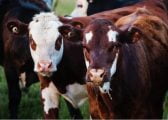Brexit, Farming and the Future

Nowhere is the consequence of Brexit more relevant than in agriculture (organic and conventional).
Unsurprisingly, post-Brexit scenarios have become quite polarised in some quarters – ranging from Armageddon to Brave New World. The reality is almost certainly somewhere in the middle.
Whatever our post-Brexit relationship with the EU, it is worth remembering that UK farming is among the best in the world. In terms of food safety and innovation, our agriculture has a pedigree second to none – and these strengths are constants in our armoury. The Government has already made clear that food production standards will remain unchanged post-Brexit. This is pivotal because high governance within the food chain – whether sourcing raw materials for animal feed or avoiding cross contamination in food processing – protects the high value brand that is UK food.
Not unreasonably, people want to know the expected tariffs in the wake of a ‘no deal.’ The assumption that World Trade Organisation (WTO) rules would apply (typically placing export tariffs at between 45% to 50% in the case of meat and cereals*) is wholly misleading. Only 24 countries and territories trade with the UK under WTO rules (and even these have arrangements with the EU to make trade easier). The UK (through the EU) has agreements with 68 other non-EU countries to enable preferential trade. Therefore, in the event of a ‘no deal’, the UK – with its large market – is well placed to broker terms far superior to WTO rules with the EU (and others).
Also, there is a keenness to know whether a ‘no deal’ would disrupt continuity of supply of feed ingredients. Whilst one should always be vigilant to changing conditions, key to any supply chain is trust and reputable trading history – and providing these are in place and recognised trading terms exit between the parties involved, matters should proceed unhindered.
It is worth noting above all that by any objective analysis, a situation in which the UK leaves the EU without agreement remains unlikely given the mutual interests of the UK and the EU in securing a negotiated outcome.

Organic Farming
In the event of a ‘no deal’ the short-term implications are likely to have little effect. The UK has stated that it is retaining EU regulation in UK law, and expects to negotiate an equivalency arrangement with the EU, which will allow the free movement of organic goods between the EU and the UK.
With Brexit likely to enhance the UK’s global trade, the high food safety standards it attains provide much sought after ‘added-value’, add ‘organic’ to this already premium product, and you add further value still. Such a high value brand has openings in countries such as the US, where organic demand outstrips production.
Defra’s direction of travel under Michael Gove is giving the organic sector grounds for optimism, even if viewed cautiously at this stage. Talk of rewards for more ecologically sustainable farming, higher animal welfare and more biodiversity can only be welcomed by organic farmers, for whom such criteria is already established routine.
Having a Defra Minister personally committed to Brexit (he was a lead campaigner for leave) with a sympathetic ear, perhaps offers organic farmers the best opportunity yet to significantly increase their share of UK agriculture. This is a point not missed on bodies such as the Soil Association and Organic Farmers & Growers, both of whom quickly produced reports for Defra’s attention.
Included within its six-point plan, The Soil Association wants an Investing In Soil programme, which it cites as fundamental to farm productivity, food security, climate change and public health; it also calls for policies to drive the organic market in the UK to levels parallel to other European counties such as Sweden (16%). For its part, Organic Farmers & Growers (OF&G) has seized on the theme of food production as part of good public governance.
The Soil Association’ latest Organic Market Report places the UK market at £2.2 billion, growing 6% in 2017 and accounting for 1.5% of the total UK food and drink market. This was the sixth consecutive year of growth. But if the sector is to get anywhere near reaching the dizzy heights enjoyed by some of our European neighbours, a greater understanding among consumers of organic food and its production is vital. To increase understanding on the scale needed would require a government-led drive – something that actually looks a real possibility in the current climate.
 More Generally
More Generally
What seems certain under new proposals is that all farmers will see a greater proportion of income coming from activities deemed to be of a certain environmental status. In Mr Gove’s own words, he wants to see a ‘green Brexit’. Draft proposals mention financial incentives to produce ‘public goods’, which it describes as services or products that unregulated markets either under-provide or fail to provide at all, such as a clean and attractive environment or a neighbourhood park.
Under such a scheme farmers would be rewarded for managing assets that are considered of public value such as farmland and woodland. The consultation paper suggested a number of ways of replacing CAP subsidies, including offering farmers’ payment ‘for delivering environmentally beneficial outcomes’. This might be restoring peat bog or protecting dry stone walls.
While those who manage the land will need to meet the challenges of the post-Brexit world and of changing agricultural policy, the UK farmer’s strongest hand is as food producer. And, as always, it is to that end that companies such as H J Lea Oakes must engage. Produced to the highest safety standards in the world; backed by a home market seeking local produce, and on the cusp of its largest export market ever, UK food is a gigantic asset to the farmer and to the nation.
* WTO rules state a maximum tariff level for import into the EU of €95 for wheat and nil for soya meal; but the level applied (if any) to the UK in the event of a ‘no deal’ is unknown.







